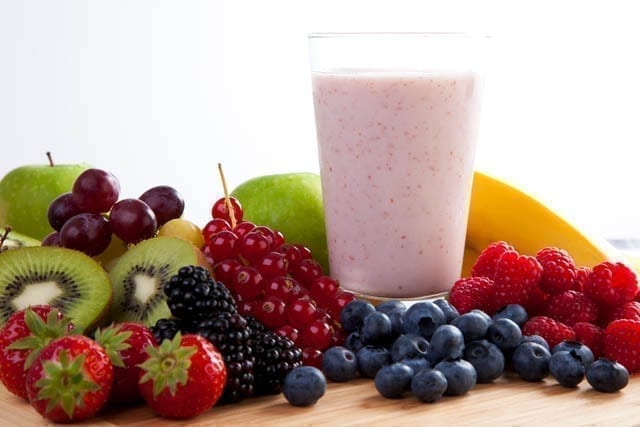Ever wonder where the term fathead came from? Maybe it’s because roughly 60 percent of the human brain is made of fat! The brain is also a hog: Every time your heart beats, 25 percent of the nutrients and blood from that effort go right to the brain. The more you can do to promote brain health, the lower your risk that you’ll develop the symptoms of Alzheimer’s.
A well-publicized study, recently published by researchers at Columbia University in New York, found that people who follow the so-called Mediterranean diet — a mainly plant-based diet that includes fruits, vegetables, nuts, legumes, seafood and heart-healthy canola and olive oils — were at the lowest risk of developing Alzheimer’s disease.
“A brain-healthy diet is one that reduces the risk of heart disease and diabetes, encourages good blood flow to the brain and is low in fat and cholesterol,” says Nancy Udelson, the executive director of the Alzheimer’s Association’s Cleveland Area Chapter.
“I wouldn’t be surprised if in a few years researchers find even more links between Alzheimer’s and nutrition, given the dramatic changes in the human diet that have taken place in the recent past,” says Paul Nussbaum, PhD, a clinical neuropsychologist and the chairman of the Alzheimer’s Prevention Advisory Council for the Alzheimer’s Foundation of America.
Try This
Antioxidant-rich berries are some of nature’s miracle foods. For a quick, delicious breakfast, try this yummy smoothie: Mix 10 ounces of fat-free yogurt, 9 ounces of orange juice, half a banana, 2 ounces of fresh or frozen berries (blueberries, raspberries, blackberries) and 1 tablespoon of flaxseeds in a blender until smooth.
Take fat, for example. Just like “bad” fats clog arteries throughout the body, they also clog the blood vessels in your brain. Dr. Nussbaum’s number one suggestion to start changing your diet? “Don’t eat in your car,” he says. In other words, avoid fast food: “It’s totally processed and full of salt and bad fats,” Dr. Nussbaum says.
QUIZ: Are You Eating for Health and Beauty?
Wise up your diet with these smart tactics:
Focus on Healthy Fats
We’ve all been, ahem, brainwashed to think that all fat is bad. But when it comes to brain health, and reducing those Alzheimer’s symptoms, we need omega-3 fatty acids, the kind found in fatty, coldwater fishes such as salmon, herring, sardines and tuna. The fats in these foods are the most similar to the fats that make up the majority of the brain. “Omega-3s propel information from one nerve cell to another,” explains Dr. Nussbaum, who specializes in aging and brain health. In addition to the fatty fishes, you can find omega-3s in flaxseeds, walnuts, beans, canola oil and winter squash. If you think that you’re not getting enough omega-3s in your diet through whole foods, you can take a fish oil supplement to boost your intake.Add Up Your Antioxidants
Antioxidants — helpful substances that protect cells from damaging molecules called free radicals — may be useful in the battle against Alzheimer’s by preventing the toxic plaque that causes the disease from forming. Among the compounds researchers have identified as helpful are aged garlic extract, curcumin (found in the spice turmeric), melatonin (found in sunflower seeds and spices like coriander and celery seeds), resveratrol (found in red wine), ginkgo biloba extract and green tea.
While specific recommendations on amounts of these nutrients have yet to be determined, filling your plate with antioxidant-rich whole foods (which benefit your whole body) is just plain smart on many counts. Look for dark-skinned and -leafed vegetables such as kale, spinach, broccoli and red bell pepper, and fruits (fresh or dried) such as red grapes, blueberries, blackberries, strawberries and cherries. For instance, try a spinach salad tossed with dried cherries or raisins and some sunflower seeds for crunch!
Say Your B, C, E’s
There is some indication that vitamin E (either alone or in combination with vitamin C), vitamin B12 and folate may be important in lowering your risk of developing Alzheimer’s, says Udelson. Eating whole foods that contain these brain-healthy vitamins is ideal (although a good multivitamin can also serve as an insurance policy).
- Seek out C in red bell peppers, broccoli, cauliflower, strawberries, kiwi, oranges, and leafy greens.
- Enrich your E intake with wheat germ, peanut butter and sunflower oil.
- Boost B12 with a high-fiber fortified breakfast cereal
- Fill your folate needs with avocados, legumes and leafy green vegetables.
MORE: Apple Pear Jicama Waldorf Salad for Vitamin E
The Skinny on Alzheimer’s and Your Weight
Being overweight increases your risk of developing a laundry list of life-threatening conditions, but it also increases your risk of developing dementia (defined as impaired thinking and memory loss — sometimes, but not always, caused by Alzheimer’s) and Alzheimer’s disease. Here are some of the links researchers have found between excess weight and impaired brain function:
- Being extremely overweight (having a body mass index, or BMI, over 30) in middle age makes you twice as likely to develop dementia later in life.
- Having high blood pressure and high cholesterol — which are also linked with being overweight — means six times the risk of developing dementia.
- Those who are moderately to extremely overweight have brains that are 4 to 8 percent smaller (with the brain shrinking as body weight rises) than subjects who are within healthy weight ranges.
The news is particularly alarming for those carrying the most weight (people with a BMI of 30 and above): On MRI scans, researchers at UCLA and the University of Pittsburgh have noticed that the areas of the brain that shrunk the most were the frontal temporal lobes, where higher-order reasoning and judgment take place. The parts of the brain responsible for attention and decision making, for long-term memory and for smooth movements were also affected.
—by Dana Sullivan




































